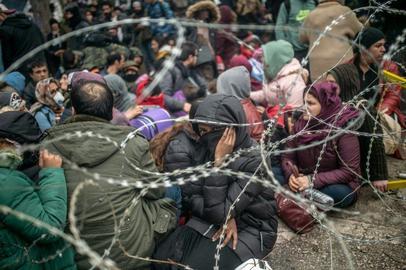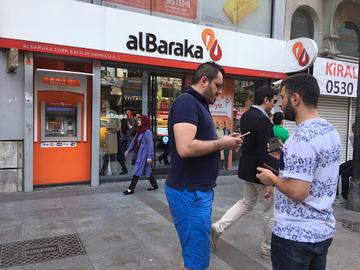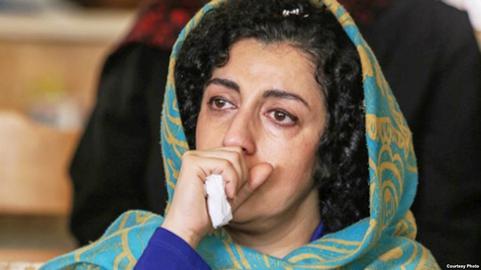For many, the coronavirus outbreak in Turkey does not simply mean dealing with the threat of a deadly virus, It also means the threat of unemployment, poverty, hunger and homelessness.
This is particularly true among refugees living in Turkey. According to Turkey’s official statistics, 40,000 Iranian refugees currently live there, although these numbers do not include asylum seekers whose applications have not yet been registered or those who are living in the country illegally. Lacking official work permits, many of these refugees have resorted to making a living by working in the black market, but with the outbreak of coronavirus, they have been forced to stay at home. These refugees have no work, cannot pay their rent and there are no organizations or institutions that take responsibility for them.
“My son was eight years old when we came to Turkey. He is now 14. Before the coronavirus outbreak, there were days when we had nothing to eat. I wouldn’t wake him up and I would keep the curtains closed so that the house would stay dark. I did this so that he would think that it was still night, keep sleeping and not ask for any food. Some days, I would be able to give him two meals, each of which only consisted of bread and cheese. Now that I’m unemployed I have fallen two months behind on the rent and we are borrowing food from friends and neighbors.”
Samira has been seeking asylum in Turkey with her only son since 2015. Two years ago, her asylum application was referred to court but it is still unclear how long she will have to wait until she is informed of the result. During these years, she has lived alone with her son and struggled with the problems of being a single mother in Turkey. As a refugee woman, she faces a range of difficulties, from the hardship of working as a manual laborer in factories to enduring sexism and sexual harassment.
She is just one of thousands of Iranian refugees who have been waiting for years for their future to be determined. With the coronavirus outbreak in Turkey, her life, like many others, is marked by the terrible turmoil and uncertainty of worrying about homelessness, unemployment and making ends meet. Asylum seekers had a difficult time surviving before the outbreak, but now, even providing a morsel of bread for their families has become a daily concern.
Low Pay, Long Hours, Sexism
In Turkey, asylum seekers can only work if their employer notifies the Department of Labor and agrees to pay the asylum seekers’ taxes. In most cases, however, given Turkey’s high number of immigrants and asylum seekers and the country’s economic problems, employers pay asylum seekers the minimum wage or less, force them to work long hours, and do not pay their taxes. Many asylum seekers are made to work from early in the morning to late at night, earning approximately 60 Turkish lira — roughly eight euros or US$8.65 for more than 12 hours’ work.
Samira is one of many asylum seekers who has worked for several years but still does not even earn the minimum wage. “I’ve worked in stonework, restaurants, towel factories, sanding and every other type of work you can think of,” she says, “work which is assumed to be too difficult for women. I worked for 30 lire a day and bought a portable gas stove for 20 lire so that I could feed my child. We were forced to take risks and work in the black market. If the police found out, we would have had to pay between 3,000 and 7,000 lire in fines. I know people who have been waiting for a response to their asylum applications for over 10 years. There are many women here who commit suicide without anyone even realizing it. You have to endure demanding workloads with low pay, sexist views from your neighbors, your co-workers and employers just to put bread on the table. I speak with the support of all the women and friends I know. Tell our story to the United Nations.”
Many of these poverty-stricken refugees look to Europe for hope. Unemployment, the lack of financial assistance for asylum seekers, Turkey’s difficult economic conditions, especially during the pandemic, the lack of any clear prospect for asylum seekers’ applications, the lack of information about dangerous international human smuggling routes and misinformation about immigration laws in European countries have meant that many refugees consider leaving Turkey illegally.
“After enduring six years in Turkey, our asylum case has been appealed,” Samira said. “I want to know if any UN employee could live and survive like us? Asylum seekers get tired of waiting and struggling just to survive and so they resort to illegal smuggling. They take their lives and the lives of their children into their own hands and they are willing to travel across seas or mountains. They say to us, ‘stay at home’ — but what about our children?”
Samira’s story is the story of the lives of many refugee women in Turkey, and of those who are forced into migration across the world. When these women are mothers, their suffering and hardship is even greater. In Turkey, there are no monthly stipends for asylum seekers and migrants have been unable to obtain any form of government subsidy during the coronavirus outbreak. This is the case for all refugees whether they are refugees for political or social reasons, journalists or any other form of migrant.
No Clear Future
Mehdi Eslami is a political refugee living in Turkey. He lives with his wife and young child in a 45-square-meter apartment for which he pays a minimum monthly rent and energy bill of 1,000 lire. Now, with the pandemic and worsening unemployment for refugees, he, like many other immigrants, has been unable to afford his rent. His requests to the United Nations for aid and support have been unsuccessful, as has been the case for many refugees.
“I first contacted the police department and they said that I should call the Ministry of Social Affairs but this too was useless,” he told me. “I spoke to the Refugees Affairs Office of the United Nations in Ankara and after I answered a number of their questions they said that the allowance could only be given to refugees who had three or more children. I explained to them that not only my family but many other refugees were unable to pay their rent and bills in the current conditions and that we didn’t even have enough money to buy bread. It was no use.”
Even after having lived in Turkey as a refugee for three and a half years, Mehdi Eslami still does not have a clear future. He has applied for a legal work permit several times. “Even before coronavirus, we still had the same problems, but at least I was able to find work on the black market. If we were given permission to work, an employer is only able to accept one foreign worker for every five Turkish workers that they employ. In that case, we must then pay approximately 800 or 1000 lira for insurance and pension costs. That means that if we earn a base salary of 2,350 lire, we pay 1000 lira for rent and 1000 for the insurance and pension. After that there is almost no money left to buy food.”
Over the last few years, Eslami has worked in stone cutting workshops, carpet factories and sewing textiles. Working from eight in the morning until six in the evening, he received a daily wage of 60 lire. With the outbreak of the pandemic and the widespread imposition of quarantine throughout Turkey, there is no longer any available work. “The landlord has said that if we cannot pay the rent we will be evicted from the apartment. We only want the United Nations and other human rights organizations to hear our voices. Why aren’t our cases being investigated? We have nowhere to go. Not only me, but all of my friends are in the same situation. Everyone is anxious and depressed about what they need to do to survive. One said to me that he is borrowing bread, another is eating potatoes, while another only has an egg to eat. We don’t want an excessive amount of money, we just need help so that we can live.
There are numerous other examples from refugees living in Turkey. Before the current crisis, many refugees traveled and worked in the cities near to where they live. Now they have lost even that small source of income and they have been forced to stay at home because of government directives. Many will become homeless because they can’t pay their rent.
IranWire contacted the UN Refugee Agency (UNHCR) and a number of immigration offices in Turkish cities for comment. A UNHCR official said that due to the high number of asylum seekers, the lack of funding and the economic crisis Turkey is currently facing, it is not possible for all migrants to receive aid and that only those who were living in what they called “extreme poverty” would receive financial help. However, no definition for what constituted “extreme poverty” was provided, and the official did not respond to all the queries I put to the agency.
Turkey has a refugee population of close to four million, of which Iranians are among one of the least populous groups. On March 26 this year, the European Union’s agreements with Turkey concerning financial payments for maintaining migrant populations expired. Decisions about the fate of asylum seekers have been put on hold, as have solutions to how they can be fed and clothed. And with this delay, these people’s hopes have also been put on hold because of coronavirus. It remains to be seen how many people will become homeless, unemployed, forced into poverty or resort to illegal smuggling abroad as a result of the pandemic.
According to the official statistics of the International Labour Organization, it is possible that over 195 million people worldwide will be made unemployed as a result of the pandemic. Of course, refugees who work in the black market will not be included in this figure. At least 71 million refugees are displaced worldwide, according to the UN’s official statistics. It can be assumed that the pandemic has forced many millions of these refugees into poverty and unemployment.
visit the accountability section
In this section of Iran Wire, you can contact the officials and launch your campaign for various problems



























comments